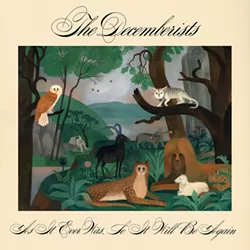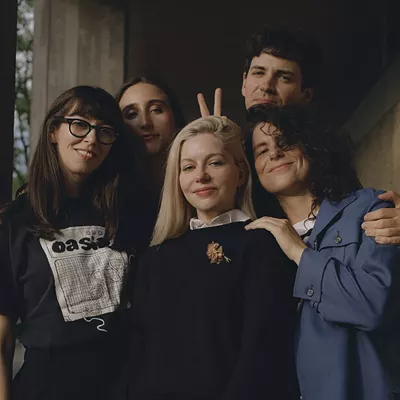Listening through The Decemberists' discography calls to mind ambling into a top-flight used bookstore. The breadth of offerings can be somewhat overwhelming. Each tune feels like one of the novels crammed onto the shelves — a colorful rainbow of lovingly worn spines that beckon the literary-minded to explore their lushly detailed worlds. Some of these stories stand alone, while others unfold over multiple volumes. The walls are strewn with tales of history, whaling, political commentary, the sporting life, espionage, and, of course, the joy of love and the ache of loss expressed via frontman Colin Meloy's finely crafted prose.
While it might take a few months' residence in such welcomingly musty confines, The Decemberists' newest opus, As It Ever Was, So It Will Be Again, continues the Portland's groups hyperliterate and sonically diverse indie rock storytelling ways. It's also undeniably a tome, the first Decemberists' double record, unfurling over the course of four distinct sides in vinyl form. It's an expansive 13-song listening experience — one that the band will heavily explore when playing the Riverfront Pavilion on July 27 — which caught Meloy somewhat by surprise despite having a backlog of songs accumulating since The Decemberists' last record in 2018.
"I really did not expect it, even though I did come into the session with certainly more material, more demos than I had really ever before," Meloy says. "There were like 25 or 26 songs, which is kind of unheard of for us. Usually it's more a couple songs above the bare minimum for the record. So that had a big part of it."
"Once we had to start actually sequencing it, it just became clear that 'I think this has a shot. I think this could be a double record,'" he continues. "And I'd always sort of wished What a Terrible World, What a Beautiful World had been a double record. So I always harbored this desire to make a proper double record, which we hadn't done, and figured this was the time to do it, if ever."
As It Ever Was, So It Will Be Again commences with bursts of catchy and lively mirth on the album's side A. The opening track, "Burial Ground," finds The Decemberists at their most gleefully gothic, an upbeat folky tune about spending time where bodies lie that feels like a summery picnic at the graveyard. The horn-driven "Oh No!" blurs European musical traditions — somewhere in the Venn diagram of tango, oom-pah and Balkan folk music — while the band is just having a blast. The side-closing "Long White Veil" catchily touches on always fertile lyrical ground for Meloy — love and tragedy crammed together with a dash of macabre mystery and possibly an unreliable narrator.
Side B of the album certainly gets more somber tunes like "The Black Maria" and "All I Want Is You" slowly creating an eclipse-like darkness to shut out the album's early bright rays. But the third act attempts to let a bit of light back in, starting with "Born to the Morning," which finds The Decemberists in their most fuzzed-out and spacey psychedelic rock-esque mode. Things further chill out to a soft-drifting sway on "Tell Me What's on Your Mind" and the loving ease of "Never Satisfied."
As It Ever Was... doesn't go out with a whimper as the entire final side of the double record is a single song — "Joan in the Garden." The meta 19-minute epic finds Meloy wrestling with his own creative process after reading a book about Joan of Arc and wanting to make it into a song. After starting out in the group's traditional style, things shift about 10 minutes in to become an instrumental exploration of sonic space, before once again shifting into almost a Dio-esque hard rock/metal tune to close things out in style.
"The whole process of doing 'Joan in the Garden' was a really interesting and fun experiment. That really required everything of everybody. I felt like I was always learning something from that song as we were recording it," Meloy says. "I knew that it was going to be long. I think the way I had demoed it was three different parts. It wasn't until we started working on it, that I realized it needed to be as long as it became. It needed that kind of sound bath experience in the middle of it to make the whole thing structurally work. So it definitely expanded as we continued working on it."
It's no shock that Meloy revels in the creative process behind songs that put writing at the forefront. Considering his prodigious vocabulary is what has drawn many listeners to the Decemberists since the band's formation in 2000, it came as no surprise to anyone that the Montana native would eventually find his way into the more formal literary world.
After penning a 33 1/3 book about The Replacements' classic album Let It Be in 2004, Meloy turned his attention to writing children's novels. Starting in 2011, he teamed up with his illustrator wife, Carson Ellis, to craft the best-selling Wildwood series, in which young protagonist Prue has adventures in a magical Pacific Northwest forest.
For Meloy, having both songs and books as creative outlets helps keep his writing brain firing.
"Not being a neurologist, I can't speak to it, but I assume that they come from essentially the same part of your brain. They definitely tap into a very similar impulse," Meloy says. "But structurally, as far as the labor goes, the actual work, they feel very different. I mean, as different as baking to computer programming. I think they do tend to complement each other in that way. Each one kind of feels like a break from the other. And the kind of limitations of one can feel freed by another. They're kind of perfectly complementary. Like the brevity and the simplicity of songwriting can be just such a relief if you've been struggling through, you know, writing thousands of words in a book. Similarly what you can do writing prose is not nothing that you will ever quite get from writing songs with all the sort of structural limitations."
But much like the work life with The Decemberists, Meloy's collaboration with Ellis helps keep the writing process from being a solely solitary endeavor. Having an artistic partner beside him helps fuel both the prose and the music.
"The fact that we are fellow travelers in this very strange world of making art for a living is huge, doing this thing that is so strange and feels like it comes out of nowhere sometimes," Meloy says of his partner. "I think in some ways, even though we're always doing very different things, just having somebody who has a similar experience to you that you can relate to and who can push you, and you can see their work and decide that you kind of need to drive yourself a little harder too? I mean, that's invaluable."
Browsing The Decemberists' sonic bookshelves remains a completely invigorating way to while away a summer evening, but as both Meloy and the characters in his books and songs know, it's an even more enlivening and joyous life when you're not perusing alone. ♦
The Decemberists, Ratboys • Sat, July 27 at 7 pm • $50-$199 • All ages • Spokane Pavilion • 574 N. Howard St. • spokanepavilion.com

























